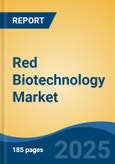Speak directly to the analyst to clarify any post sales queries you may have.
10% Free customizationThis report comes with 10% free customization, enabling you to add data that meets your specific business needs.
Key Market Drivers
Rising Demand for Biopharmaceuticals in Chronic and Rare Disease Management
The increasing prevalence of chronic and rare diseases is a major factor accelerating the demand for red biotechnology, especially in the development of biopharmaceuticals such as recombinant proteins, monoclonal antibodies, and gene therapies. These innovations are addressing unmet medical needs where traditional treatments fall short. According to the World Health Organization (WHO), chronic illnesses - including cancer, cardiovascular diseases, diabetes, and respiratory disorders - account for approximately 74% of all global deaths. In parallel, rare diseases impact over 300 million individuals worldwide. Red biotechnology plays a vital role in the development of precision therapies for these complex health conditions, driving investment and research in this field globally.Key Market Challenges
High Development Costs and Complex Regulatory Requirements
A major challenge in the red biotechnology market is the substantial cost and complexity associated with developing advanced therapeutics such as gene therapies and biologics. The R&D process involves extensive clinical trials, strict regulatory compliance, and rigorous quality controls, often resulting in long timelines and high expenses. According to the U.S.Congressional Budget Office (CBO), the cost of developing a single biopharmaceutical product can exceed $2.6 billion, and innovations within red biotechnology frequently surpass this due to their technical intricacies. Regulatory bodies such as the FDA and EMA impose detailed requirements for safety, efficacy, and long-term monitoring, particularly for gene-editing therapies. The variability in regulatory frameworks across different countries adds further challenges to global product launches, impacting speed to market and operational efficiency.
Key Market Trends
Expansion of Personalized Medicine and Genomics-Based Therapies
A transformative trend in the red biotechnology market is the rapid advancement of personalized medicine and genomics-driven therapies. Personalized medicine involves tailoring treatments to individual patients based on genetic, environmental, and lifestyle factors. Red biotechnology is central to this trend through the development of targeted therapies, gene-editing tools, and molecular diagnostics. The widespread adoption of next-generation sequencing (NGS) and genomic profiling has enabled deeper understanding of disease mechanisms, supporting the creation of patient-specific treatment plans. The declining cost of genome sequencing - from nearly $100 million in 2001 to under $1,000 in 2024 - has accelerated clinical integration of genomics, propelling growth in red biotechnology applications.Key Market Players
- Pfizer, Inc.
- Takeda Pharmaceutical Company Limited
- Gilead Sciences
- Regeneron Pharmaceuticals, Inc.
- F. Hoffmann-La Roche Ltd.
- Bruker Corporation
- Merck KGaA
- Celgene Corporation
- Amgen Inc.
- Biogen Inc.
Report Scope:
In this report, the Global Red Biotechnology Market has been segmented into the following categories, in addition to the industry trends which have also been detailed below:Red Biotechnology Market, By Product Type:
- Diagnostic Reagents
- Human Vaccines
- Blood Products
- Gene Recombinant Drugs
- Others
Red Biotechnology Market, By Application:
- Biopharmaceutical Production
- Gene Therapy
- Genetic Testing
- Pharmacogenomics
- Drug Discovery
- Others
Red Biotechnology Market, By End-User:
- Pharmaceutical and Biotechnology Companies
- CMO & CRO
- Research Institute
- Others
Red Biotechnology Market, By Region:
- North America
- United States
- Mexico
- Canada
- Europe
- France
- Germany
- United Kingdom
- Italy
- Spain
- Asia-Pacific
- China
- India
- South Korea
- Japan
- Australia
- South America
- Brazil
- Argentina
- Colombia
- Middle East and Africa
- South Africa
- Saudi Arabia
- UAE
Competitive Landscape
Company Profiles: Detailed analysis of the major companies present in the Global Red Biotechnology Market.Available Customizations:
With the given market data, the publisher offers customizations according to a company's specific needs. The following customization options are available for the report.Company Information
- Detailed analysis and profiling of additional market players (up to five).
This product will be delivered within 1-3 business days.
Table of Contents
Companies Mentioned
- Pfizer, Inc.
- Takeda Pharmaceutical Company Limited
- Gilead Sciences
- Regeneron Pharmaceuticals, Inc.
- F. Hoffmann-La Roche Ltd.
- Bruker Corporation
- Merck KGaA
- Celgene Corporation
- Amgen Inc.
- Biogen Inc.
Table Information
| Report Attribute | Details |
|---|---|
| No. of Pages | 185 |
| Published | June 2025 |
| Forecast Period | 2024 - 2030 |
| Estimated Market Value ( USD | $ 421.32 Billion |
| Forecasted Market Value ( USD | $ 774.15 Billion |
| Compound Annual Growth Rate | 10.6% |
| Regions Covered | Global |
| No. of Companies Mentioned | 10 |









